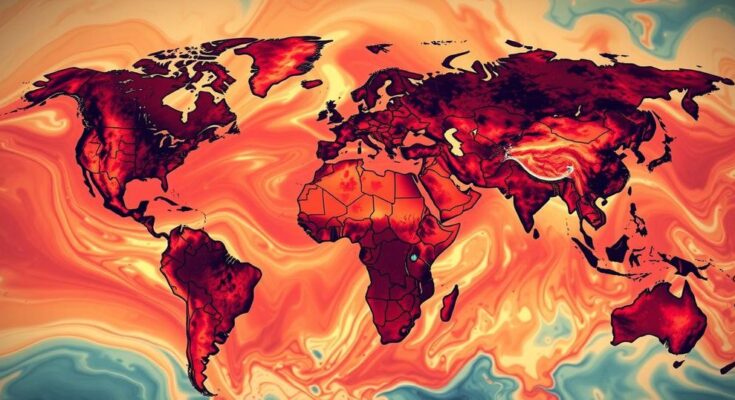In 2024, climate change caused an average of 41 extra days of dangerous heat globally, making it likely the hottest year on record. Scientists highlighted the role of human-induced climate change in intensifying extreme weather events, linked to at least 3,700 deaths and millions displaced. Urgent action is required to mitigate these impacts and prepare for future challenges.
In 2024, climate change exacerbated global heat levels, resulting in an estimated average of 41 additional days of dangerous heat for people worldwide. This alarming declaration was made by a group of scientists from World Weather Attribution and Climate Central, highlighting the link between human activity and intensifying weather patterns. Notably, 2024 is on track to be recorded as the hottest year measured, further compounding the effects of extreme weather events, including heatwaves and tropical cyclones, resulting in millions of displaced individuals and significant mortality rates.
“Climate change did play a role, and often a major role, in most of the events we studied, making heat, droughts, tropical cyclones and heavy rainfall more likely and more intense across the world,” stated Friederike Otto, an Imperial College climate scientist and lead of World Weather Attribution. This year’s unprecedented heat affected regions globally, including Northern California, Mexico, and parts of Africa, prompting extreme measures such as closing the Acropolis in Greece due to extreme temperatures.
Research focused on 29 extreme weather events that claimed at least 3,700 lives and displaced millions, determining that 26 of these incidents were linked to climate change. While the El Niño phenomenon played a role in these conditions, scientists concluded that climate change had a more substantial impact. Jennifer Francis, a climate scientist from the Woodwell Climate Research Center, emphasized the increasing frequency and intensity of extreme weather until reductions in greenhouse gas emissions occur.
The United Nations Environment Programme warned that without effective action, climate extremes are likely to escalate. However, experts affirm that with proactive adaptive measures, the devastating impacts of climate change can be mitigated. Julie Arrighi of the Red Cross Red Crescent Climate Centre stated, “Countries can reduce those impacts by preparing for climate change and adapting for climate change.”
The article discusses the significant impact of climate change on global temperatures and extreme weather events, focusing specifically on the year 2024. It reports findings from various scientific studies that indicate measurable increases in dangerous heat days, linked directly to human-induced climate change. The consequences of rising temperatures are explored, including public health risks, socioeconomic challenges, and the escalation of extreme weather phenomena such as heatwaves, droughts, and heavy rainfall across diverse geographical regions. Furthermore, it assesses the effectiveness of national and international efforts in combating climate change.
The findings of 2024 emphasize the urgent need for global action to combat climate change, as its effects are already evident in the form of increased dangerous heat and extreme weather events. With continuing reliance on fossil fuels, the situation is expected to worsen unless substantial mitigation and adaptation strategies are implemented. Scientists reaffirmed that collective responsibility among nations is crucial to reduce the impacts of climate change and protect vulnerable populations worldwide.
Original Source: www.nationalobserver.com




